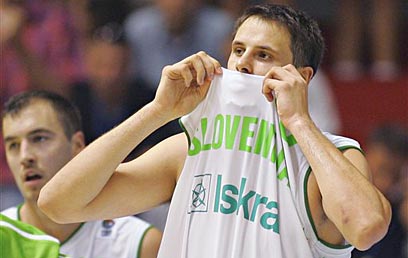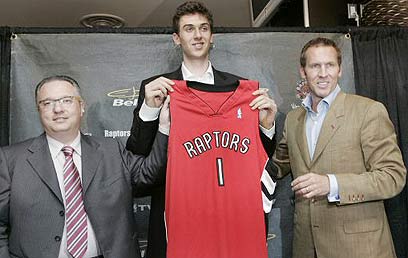
NBA players tempted by European clubs
Summer 2008 sees American league losing foreign players to wealthy European clubs. ' Players like Nachbar and Delfino have made the NBA dream come true and earned enough, but realized they won't become superstars over there,' agent says. Dwayne Wade: If a European team offers me 40 million dollars a year, tax-free, I might have to go over there
It all started back in the summer of 2006. NBA players Arvydas Macijauskas, Zoran Planinic, Jiri Welsch and Mario Kasun all returned from the US to their home continent of Europe. A year later, it was Sarunas Jasikevicius, Vassilis Spanoulis and Ersan Ilyasova's turn to make the same journey back; they were joined by Viktor Khryapa in mid-season.
However, all of these moves were a mere prelude to this summer's trend, in which foreign NBA players are making their way back home in droves. Juan Carlos Navarro, Carlos Delfino, Bostjan Nachbar, Primoz Brezec and Jorge Garbajosa – all made the move from the American league, considered the world's best, to Europe. American Josh Childress has joined them, and it seems as though this list is far from being closed.
There is an essential difference between the return home of European hoopsters in 2006 and 2007 to this year's trend. Most of the players that had decided to return, until a month ago, made the decision after they had become fed up with their place at the far end of the bench. The new era, however, is characterized by the transfer of high-caliber NBA players to Europe. While these players are not giving up on eight-figure salaries to move to Europe, they were definitely considered assets by the NBA coaches they were playing for.

'He wasn't even on our original list.' Bostjan Nachbar (Photo: AP)
So what motivates a player to move from the limelight of the NBA life to cold Russia, while waiving the opportunity to even play in the Euroleague? "My explanation is money, just money", says top player agent Maurizio Balducci. "Sometimes, the easiest and most simple answer is the correct one. Players like Nachbar and Delfino have made the NBA dream come true and earned enough, but realized they won't become superstars over there, so they are coming back following the money".
It's pretty difficult to argue with Balducci's statement. Among the factors that are contributing to this trend is the weakening of the US dollar in comparison with the Euro.

Coach David Blatt, who landed Nachbar in Dynamo Moscow, believes it has a lot to do with the NBA policy. "The wage system in the NBA is pretty problematic", he claims. "The top players and the rookies are enjoying this situation, but the all the players in between are losing from it".
Most of NBA teams are on the verge of violating the salary cap, or have already exceeded it. For every additional dollar paid above the 58.68 million salary cap, the teams are obligated to pay one dollar to the league as a luxury tax. "In Boston, for instance, the big three stars take up about 80 percent of the cap and there are the draft picks who make a pretty solid amount", Blatt continues. "There is a place for another player or two to make a few million, but all the others have to compromise down to the level of minimum contracts".

Raptor's Anthony Parker tries to stop Navarro (Photo: Reuters)
"This was how Dynamo Moscow managed to put its hands on Nachbar. "He wasn't even on our original list", says Blatt. "My assistant Dan Shamir went to Las Vegas to watch some players in the Summer League and speak with agents. In one of the conversations, Nachbar's name came up. We jumped on the opportunity. If he would have spent time in the market, I guess one of the big Euroleague clubs would steal him".
"I have spoken with Bostjan for many times. He wanted to stay in the NBA after proving himself in New Jersey, but had to lower his salary. Suddenly he discovered that he can return to Europe for a lot of money and leading player status. He had no reason to refuse that".
To get the full picture, we turned to Maurizio Gherardini, legendary GM of Benetton Treviso in the past and the current vice president of the Toronto Raptors. "The Americans are indeed looking at Europe differently, but I wouldn't call it a trend yet", he says. "Let's wait another two or three years and see how it goes".
This summer's signings remind Gherardini of the last 80s and early 90s: There were cycles similar to this one in the past. Danny Ferry played for Il Messaggero Roma, and then came Dino Radja. There were teams, here and there, who could tempt NBA players, usually 8th or 9th in the rotation, but now there are 15 clubs who can offer unbelievable contracts".
"We, in Benetton, had Toni Kukoc", he recalls. "He was making in the range of three million dollars net and was supposed to stay six seasons. But he left for Chicago after two years. We always knew that we would lose him at some point, and that was our challenge: to earn as much as possible from his buyout and find the next stars, before or during their breakthrough".
'Same amount of money, or even more'
Blatt also remembers the old days. "There were some stories, some true, about teams that do not pay on time and don't respect contracts, but now Europe is as good an option as it has ever been".
The Raptors have become the biggest provider of players for European clubs this summer, losing Brezec, Delfino and Garbajosa. They have managed to keep Anthony Parker, who Olympiacos Piraeus was interested in. "We didn't have any doubt that Anthony would stay, not for a second", says Gherardini. "He is our captain, he's one of our starting five, he has a valid contract and we love him. Olympiacos haven't spoken with us at any stage, so his transfer wasn't realistic".
Can European basketball threaten the NBA's dominance?
"I don't see it as a threat. Stars coming back is a blessing for European basketball, but the NBA won't lose its prestige. One of our goals is to make basketball a global game. Personally, I would rather see a talented player playing in Europe or any other place than sitting on the bench in the US".
Blatt sees it a little differently: "Everything that is happening is linked to the tightening connection between the Euroleague and the NBA. It won't be long before European clubs will be merged, in one way or another, with the NBA".

'I wouldn't call it a trend yet.' Raptor's VP Gherardini (left). Photo: Reuters
Navarro, who started the current trend, has returned to AXA Barcelona for economic reasons only. After a successful rookie season in Memphis, he had to pay Barcelona 1.5 million euros as buyout. So he passed. For Delfino it was totally different. The Argentinean forward had no limitations when he decided to sign a three-year deal with Khimki for 8.5 million euros.
"Delfino will make more than Manu Ginobili", says his agent, Alessandro Barbalich. "Carlos, like others, was a little frustrated from time to time. He is a versatile player who can do a lot on the court, but in many cases he was given defensive missions and played 15 minutes. In Europe, you get the chance to play more for the same amount of money, or even more".
According to Israeli coach Sharon Drucker, the money is important, but many players are looking for the competition.
"That was my way of convincing players to give up the dream and come to Oostende or Ural Great. In the average NBA teams, who don't make the playoffs, you can't experience the emotion of winning and losing. Some players who leave Europe for the NBA miss home".
The agents are entitled to a percentage of the profits gained in these transactions by securing their clients contracts in the old continent. They receive up to 10 percent power deal from the purchasing club, while NBA restrictions allow them a maximum of four percent commission, before tax.
According to Barbalich, the figures don't necessary affect the way he works: "If I would come to a player who dreams about the NBA and tell him to concentrate on the European option only, he wouldn't let me represent him anymore. The NBA dream will not disappear. Every basketball player, from any place in the world, will always aspire to get there, but for those who can't find their place over there, Europe is a great alternative".
Do these players really deserve the big money that they are getting in Russia and Greece? Drucker says that "money is not even an issue for some teams. They can bring players at any price. The president of Unicaja Malaga expressed his frustration from the battle over Garbajosa. Even if he would manage to raise three million euros, Khimki would increase its proposal to five million. He had no chance against them".
So far, the richest Euroleague clubs haven't joined the celebration. CSKA Moscow and Panathinaikos had focused mainly on the European market, as did Olympiacos – until it acquired Childress. Even the American media couldn't ignore the Greek club's signing of the 25-year-old Atlanta Hawks forward.
While it appears that every NBA player considered second-tier or lower has suddenly become a legitimate candidate to make the move to Europe, some legitimate NBA stars are not ruling it out either. When Stephon Marbury and Jason Kidd are mentioning the option of going overseas, it's important to make a note of it. "If they offer me 40 million dollars a year, tax-free, I might have to go over there; I’ll have to see you guys later", Dwayne Wade was joking with his American colleagues. Or maybe he was serious?










